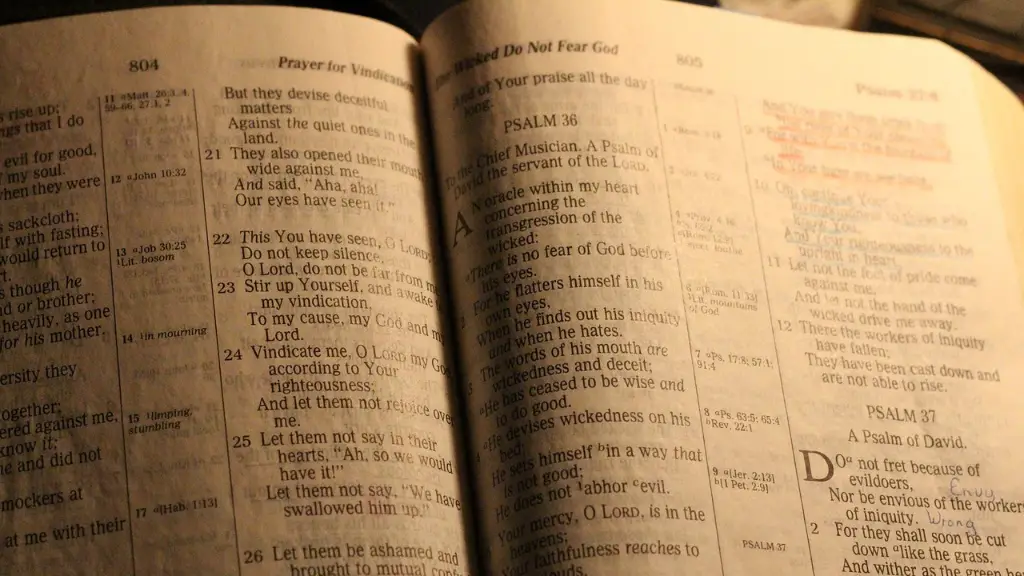Overview
Easter is a widely-celebrated Christian holiday, however many people are unaware of the scriptural foundation on which it is based. The Bible has multiple references to the resurrection of Jesus, which is the focal point of Christian faith and the Easter celebration, yet the actual term Easter does not appear in the Bible. Understanding where Easter is in the Bible requires an exploration of its scriptural roots.
Messianic Prophecy
The idea of a messiah or savior to come has been around for centuries and is found in many different religions and philosophies, however the biblical concept of a messiah is unique to the Christian faith. In the Old Testament, references to the Messiah come up often, however the New Testament is where these prophecies become solidified and, ultimately, fulfilled. In the New Testament, Jesus is shown to be the fulfiller of these Old Testament prophecies—one of the most important of which is his resurrection.
Passion Week
The Passion Week, or Holy Week, is the week leading up to Easter Sunday and recalls Jesus’s suffering, death and resurrection. This period is significant in Christianity, however it doesn’t explicitly mention Easter. Instead, it refers to Jesus’s crucifixion and resurrection. The death on the Cross and the resurrection are central to Christian belief and are the crux of the Easter celebration.
Resurrection References
The Bible mentions the resurrection of Jesus many times in the four gospels and other books of the Bible. Jesus himself predicted his resurrection on several occasions, such as in Luke 9:22, when he said he would be “killed, but on the third day be raised to life.” The four gospels of Matthew, Mark, Luke and John are four accounts of Jesus’ life, death and resurrection.
Leading Up To The Resurrection
The New Testament records many events surrounding the death and resurrection of Jesus, all of which are important to fully understanding the biblical reference to Easter. Some examples include Jesus’s entrance into Jerusalem, the Last Supper, his arrest and trial and the burial of Jesus in a tomb. Each event plays an important part in the Easter celebration.
Evidence Of The Resurrection
The Bible provides evidence to support the resurrection of Jesus Christ. After his death, Jesus was resurrected and appeared to many people, including his disciples, priests, women and children. The Bible records these encounters in the four gospels. The Bible also provides evidence for Jesus’s ascension into Heaven, which is referenced in Acts 1:3, where it says: “After his suffering, he present himself to them and gave many convincing proofs that he was alive. He appeared to them over a period of forty days and spoke about the kingdom of God.”
Modern Easter Symbols
Modern Easter celebrations often involve special foods, decorations, rituals, and symbols. These symbols, such as eggs, rabbits and the Easter bunny, are often used to celebrate the holiday. It is important to remember that the biblical foundation for Easter is found in the death and resurrection of Jesus and the promise of eternal life for those who believe in him.
Church Traditions And Practices
The Bible does not explicitly reference Easter, however there are certain church traditions and practices that have been associated with the celebration of Easter over the years. These customs include sunrise services, special church services, traditional processions, special meals or banquets, and special church music. These traditions are often used to commemorate the resurrection of Jesus.
Conclusion Of Christ’s Worship
In various books of the Bible, such as Colossians, Romans, Hebrews and Ephesians, Jesus is referred to as “Lord” and in some cases, “God.” In these texts, Jesus is recognized as being above all other gods and worthy of worship. This acknowledgement of his Lordship and deity is often seen as the conclusion of Easter and a reminder of the victory over death and sin for those who believe in him.
Theology Of The Resurrection
The theology of the resurrection is not something the Bible explicitly addresses, though it is implied. The core of the Christian belief in the resurrection is the belief that Jesus Christ died and rose from the dead, providing hope of salvation and eternal life to all those who believe in him. The resurrection is believed to be the ultimate act of redemption for all of humanity, restoring us to a right relationship with God.
Communion As A Reminder Of The Resurrection
Communion is an important ritual in the Bible and is often found in association with Easter. Communion is seen as a reminder of the death and resurrection of Jesus, a symbolic act of remembrance that celebrates Jesus’s victory over sin and death. The Bible says in 1 Corinthians 11:26, “For as often as you eat this bread and drink this cup, you proclaim the Lord’s death until he comes.”
Celebrating Easter As A Community
Easter is often seen as a time to celebrate and come together in a way that honors the resurrection of Jesus. During this time, many Christian churches come together for special services, often with an emphasis on the importance of the resurrection. Communities often celebrate the resurrection of Jesus through special activities, egg-hunting and other family-oriented events.
Theology Of Hope
Finally, the biblical reference to Easter is closely linked to the concept of hope. The Bible says in 1 Corinthians 15:19, “For as in Adam all die, so in Christ all will be made alive.” In this verse, we find a core theology of hope that is closely linked to the resurrection of Jesus. This hope gives us courage and strength to remain faithful to God despite our suffering and pain in this life.



